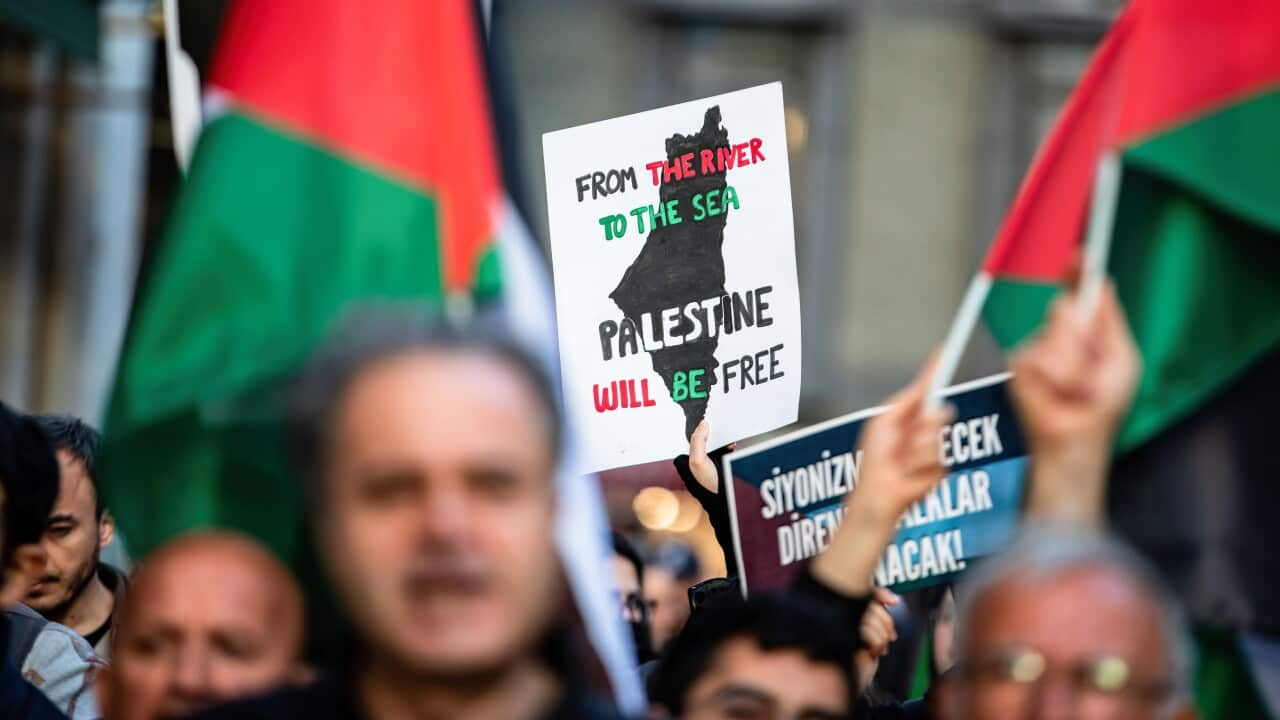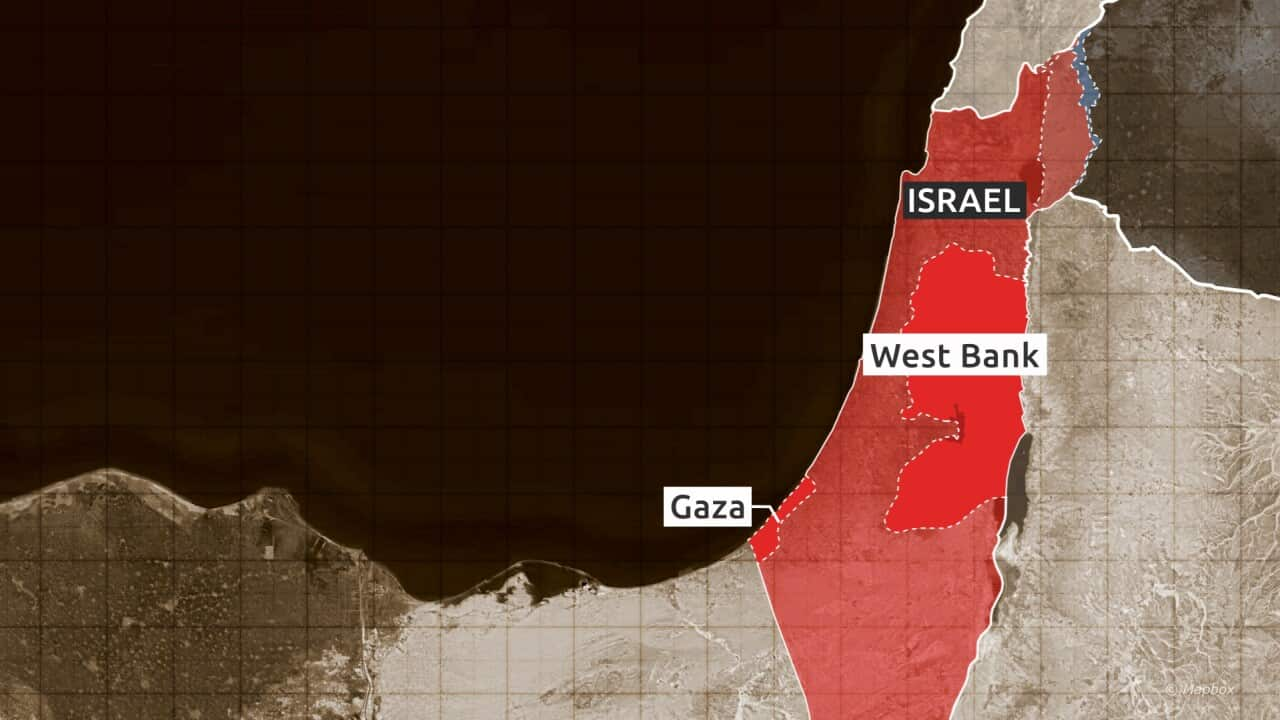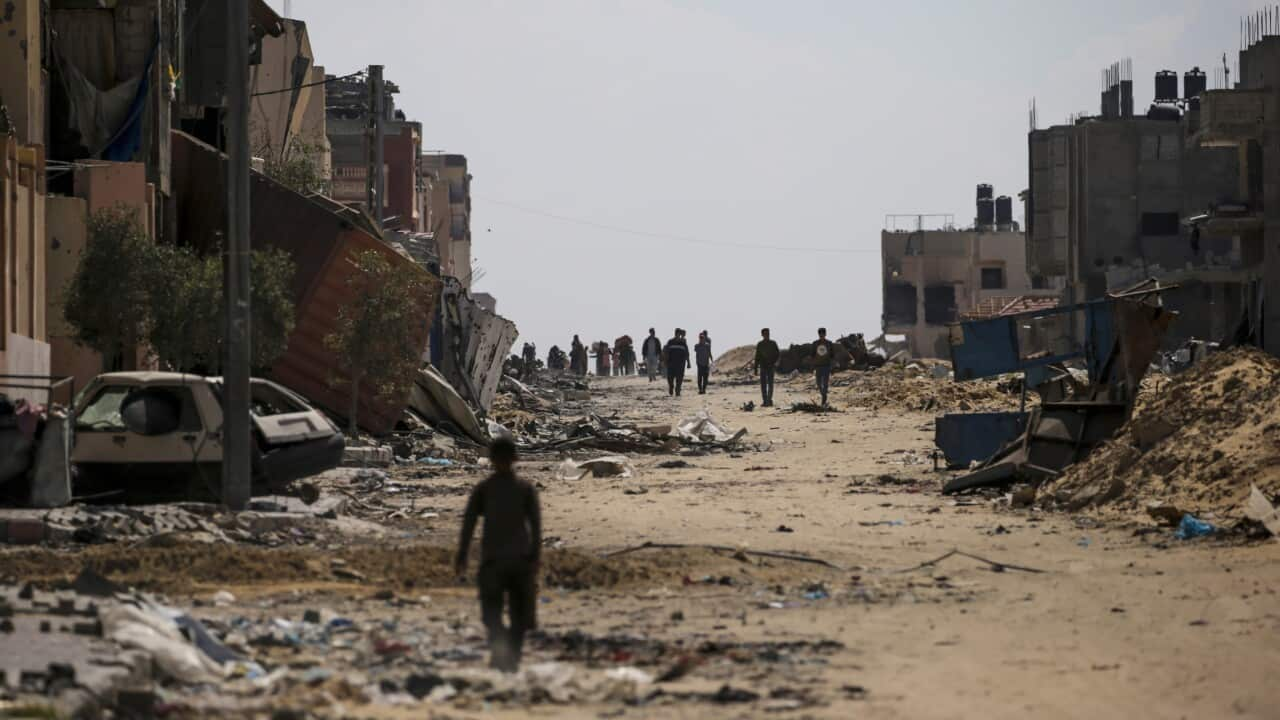The Senate the phrase "From the river to the sea, Palestine will be free" after repeated the wording while accusing Israel of genocide.
Opposition Senate leader Simon Birmingham introduced the motion, which claimed the chant "opposes Israel’s right to exist, and is frequently used by those who seek to intimidate Jewish Australians via acts of antisemitism".
Labor senators backed the motion, which passed with 56 votes in favour and 12 against.
The phrase has long been associated with the non-violent struggle for Palestinian independence, and in recent months, has been invoked by activists and rallygoers as the Hamas-Israel war continues.
The words have become a flashpoint in the broader political clash between pro-Israel and pro-Palestinian voices around the world.
They have also come to encapsulate many of the key issues and points of contention at the heart of this decades-long conflict, wherein language and rhetoric have become battlefields of their own.
So what do these words mean? And what is the story behind the phrase?
Where did the phrase come from?
The "river" and "sea" in the phrase refer to the Jordan River, which runs north to south from the Syrian-Lebanese border to the Dead Sea, and the Mediterranean Sea, some 70km to the west.
Between those two bodies of water, importantly, lie both Israel and the Palestinian territories.
The phrase itself was originally conceived by the Palestine Liberation Organization, a coalition which is internationally recognised as the official representative of the Palestinian people, shortly after the group's formation in 1964.
At that point, it essentially called for establishing a single state, "from the river to the sea", that would encompass Palestine's historic territories.
"It's an expression of Palestinian nationalism. It's basically saying that everything from the Jordan River to the Mediterranean Sea is Palestine," Martin Kear, a lecturer in international relations at the University of Sydney, told SBS News.

The phrase 'from the river to the sea, Palestine will be free' has become a controversial rallying cry. Source: AAP / Sipa USA
Over time, the phrase has been adopted, interpreted, and appropriated by various groups – including Hamas – for myriad reasons, diluting and muddying its core message.
In many people's interpretation, the shift toward a single Palestinian state in the area would implicitly mean the dissolution of the state of Israel. For others, the word "free" is taken to mean the realisation of the Palestinian people's right to self-determination.
Asked on Thursday if he thought Payman's use of the phrase was appropriate, Prime Minister Anthony Albanese said: "No, it's not."
"What's appropriate is where both Israelis and Palestinians have the right to live in peace and prosperity."
"It is not in the interests of either Israelis or Palestinians to advocate there just be one state that is a forerunner of enormous conflict and grief and we are seeing enormous grief in Gaza."
But in the 59 years since it was first coined, the phrase's meaning has transformed and, in some ways, become unfixed from objective interpretation.
"As the West Bank has begun to shrink, as Gaza and the blockade have occurred, I think the phrase has mutated and evolved into something that is much more nebulous and much more open to interpretation politically," Andrew Thomas, lecturer in international relations and Middle East studies at Deakin University, told SBS News.
Thomas also pointed out that the phrase is typically more popular among the Western diaspora of Palestinians, rather than those actually situated in the area that it refers to.
The giveaway, he said, is in the language itself.
"'From the river to the sea, Palestine will be free' is an English phrase that rhymes," Thomas noted.
"It doesn't rhyme in Arabic. So it's almost like an English catch-cry to draw in Palestinian diaspora from all over the world.
"For a lot of people," he added, "it is simply about Palestinian solidarity against Israeli occupation … a catch cry that you can say to another member of the diaspora, from any Palestinian around the world, that can say: 'We want Palestinians to have some kind of self-determination.'"
Others have taken a less charitable interpretation.
The criticisms
Birmingham is not the first to take issue with the phrase.
On 26 October, the Anti-Defamation League (ADL), an international Jewish advocacy group established to combat antisemitism and extremism, described the phrase as "an antisemitic slogan commonly featured in anti-Israel campaigns and chanted at demonstrations … denying the Jewish right to self-determination, including through the removal of Jews from their ancestral homeland".
“Demanding justice for Palestinians, or calling for a Palestinian state, should not mean, as this hateful phrase posits, denying the right of the state of Israel to exist."
It is this interpretation that has seen international politicians like Tlaib, as well as activists around the world, drawing condemnation.

The US Congress voted to censure its only Palestinian-American member, Rashida Tlaib, for defending the phrase "from the river to the sea". Source: AAP / Mariam Zuhaib
"Jews and Palestinians, be they Christian or Muslim, lived side-by-side before Israel was established in 1948," he pointed out.
"So there would be no reason why they couldn't exist together in that change. It's more about the ideal of this state."
Both Kear and Thomas also noted a hypocrisy in the criticisms levelled at the pro-Palestinian "river to the sea" chant, citing a remarkably similar phrase in the 1977 platform of Israeli Prime Minister Benjamin Netanyahu's Likud party: "Between the sea and the Jordan there will only be Israeli sovereignty."
With that phrase, Thomas explained, "Israel is basically saying only Israel has the right to exercise sovereignty between those two places, between the river and the sea."
Kear highlighted the double standard of homing in on and condemning one phrase while neglecting to do the same for the other side.
"If one chant is seen as being indicative of calling for the destruction of Israel and being genocidal, then it's the same thing for the other side," he said.
"If it's genocidal for one, it's genocidal for both."
Why so divisive?
This dualism speaks to the division at the heart of the conflict at large, which has been framed in binary terms, and the contradictory stance taken by individuals and governments who uncritically pledge their support behind one camp while broadly condemning the other.
Against this backdrop, the "river to the sea" chant — and the fury it has incited — serves as a microcosm for much larger and more serious hypocrisies.
"Any expression of Palestinian nationalism is seen and portrayed as an existential threat to Israel … [it’s] automatically characterised as being antisemitic and even genocidal," said Kear.
"Whereas on the other side of the coin, the key members of the Israeli government are saying far worse and nothing is said about the existential threat to the Palestinian nation — they don't even have a state.
"People don't seem to be concerned about the fact that Palestinians as a nation may be on the way out and just simply become a footnote in history."

Protesters during a rally in Berlin, Germany. Source: AAP / Clemens Bilan/EPA
"Rhetorically it's emblematic of a tribalism and a very emotional time for both sides," he said.
"[But] really, what most humanitarian lawyers see this phrase as meaning in a current context is Palestinians' right to self-determination."













